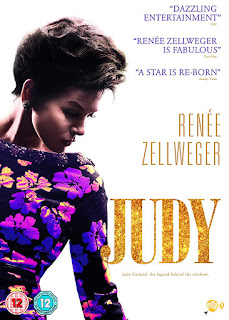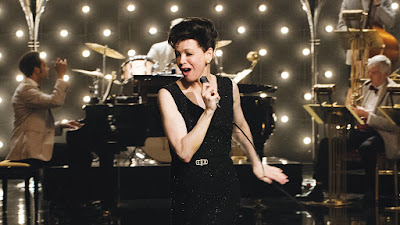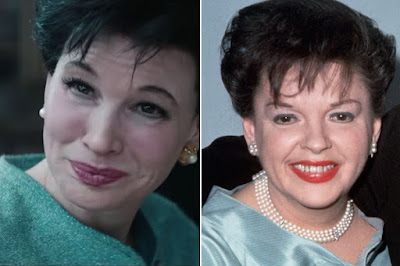 'Pathé’ have recently released their newest biopic based on the late, great, Judy Garland. It was directed by Rupert Goold; it starred Renée Zellweger, Jessie Buckley, Michael Gambon, Finn Wittrock, and Rufus Sewell; and it lasts for 118-minutes. Plus, as an extra added bonus, the standard DVD edition comes with the original theatrical trailer, deleted scenes, and two featurettes, one about the making of the movie, and the other, focused on Renée’s transformation into Judy. Please enjoy.
'Pathé’ have recently released their newest biopic based on the late, great, Judy Garland. It was directed by Rupert Goold; it starred Renée Zellweger, Jessie Buckley, Michael Gambon, Finn Wittrock, and Rufus Sewell; and it lasts for 118-minutes. Plus, as an extra added bonus, the standard DVD edition comes with the original theatrical trailer, deleted scenes, and two featurettes, one about the making of the movie, and the other, focused on Renée’s transformation into Judy. Please enjoy.Judy (2019)
THE STORY:
Now I know we haven’t known each other for very long, Rosalyn (Jessie Buckley), but during our time together, I like to think that you’ve gotten to know the many different sides to my personality, both the good side, the bad side, and the downright ugly side. Especially since I’m the star of the show and you’re my trusted assistant.
So, with that said, I’d like to ask you one simple question. Who do you think I am? Seriously, how do you see me? Am I nothing more than an antiquated actress who sings on stage so I can earn enough money to take care of my children? Or am I a pill-popping Dorothy who’s haunted by my past, scared by my future, and has bad taste in men?
Come on, Rosalyn. Don’t be shy, because I promise I won’t be offended by what you have to say about me. Me... Judy Garland (Renée Zellweger). Otherwise known as Sid Luft’s ex-wife (Rufus Sewell) and Mickey Deans' current girlfriend (Finn Wittrock). But then again, that’s most probably why what next transpires goes, clang-clang-clang, when a question is finally answered. As an acting legend doesn’t know where to go - a financial arrangement hasn't got any dough - drugs and pills become a formidable foe - and at the end of the day, please remember, a gay icon always puts on a fabulous show.
THE REVIEW:
Before this film was released, Liza Minnelli, Judy’s daughter, made a statement on Facebook that read, “I never met or spoken to Renée Zellweger”, and would never approve nor sanction this project “in any way“. Which, to be fair, sounds perfectly reasonable, because Liza's trying to protect her mother’s memory, and as an actress herself, knows how difficult it can be to tell somebody’s life story within a two-hour film. Well, not only does the person’s life have to be defined and portrayed with a certain degree of authenticity, but in addition to this, their growth, their backstory, and their circle of friends and foes have to also be historically accurate.
In this case, though, no, it isn’t historically accurate. Not totally, anyway, but it is authentically portrayed, on account of the narrative distorting real-life events in order to fit the plot. At the start of the film, for instance, we get to see Judy’s first meeting with her last husband, Mickey Deans, set in a seemingly innocent house party held in the States. But in real life, their first meeting wasn’t at a house party and wasn’t so innocent. Instead, it was in her own-home, and Mickey was giving her drugs ordered from her dealer. Also, in another scene, shown, later on, it’s implied that Louis B. Mayer began Judy on her drug dependency. When in reality, he didn’t help matters, but it was her own mother, Ethel Gumm, who started giving Judy pills while she was performing on stage with her two older sisters.
So, as you can see, this film isn’t totally accurate or consistent with the facts. But that doesn’t necessarily mean that it shies away from telling the truth or is unpleasant to watch. Far from it, in fact, because in its own charming way it manages to present us with a version of Judy’s life — emphases on the word, ‘version’ — by conveying three tales taken directly from the source. One tale was set in 1968 (a year before her death), and focused on Judy performing on stage in London. Another tale was set in 1938 (around the time she starred in ‘The Wizard of Oz’), and focused on her troubled rise to stardom. While the third tale wasn’t really a tale at all! But more like a bridge, an invisible bridge, which linked the previous two tales together via their common denominator. Namely, Judy, and how certain events that happened in her past somehow resurfaced again in her future.
Now, a good example of this can be seen midway through the movie, within a scene where Ms. Garland appears to be having some man trouble with her third husband, Sid Luft, over the custody of their children. But before the two of them can resolve their differences (so the scene can fully play out), suddenly, we are thrust back in time and presented with a corresponding scene (set in the thirties), where Judy's having some boy trouble with her co-star, Mickey Rooney, over her unfrequented love for him. Or to be more specific about it, her trouble with the opposite sex! And this goes on, back-and-forth, back-and-forth, with each two-sided scene touching upon a different aspect of Judy’s life, such as her drug addiction, her need to perform, etc, etc, etc, until we start to understand who she was as a person, a performer, and a star of yesteryear (Keeping in mind that at least thirty to forty years of her life has either been ignored or indirectly alluded to).
In regards to the style of this film, however, and all in all, I'd say everything seen on screen is well presented as it tried to conform to the era it's set in. So whenever the narrative is focused on the sixties, we're shown hairstyles that range from mod to beehive, attire that’s either form-fitting or conservative by design, as well as backgrounds that encapsulate urban chic, Art Deco glamour, and of course, everything that goes on, inside a theatre. Similarly, those scenes set in the thirties were pure Americana in both tone and style, even though they were mainly centered on the numerous studio departments where Judy was making 'Oz'. Having said that, though, the one thing that I didn’t like about this film’s aesthetics – the only one, mind you -- has to do with the lighting occasionally being too harsh on the actor’s faces, especially Judy’s, as it gave them a gaunt, flat quality, that felt fairly out of place.
Anyway, that’s enough of that for the time being, because now seems like a pretty good time for us to sit back, relax, and check out the following filmic facts: (1) ’Pathé’ first released this biopic at the ‘Telluride Film Festival’ on the 30th of August, 2019, and eventually clawed back $39 million at the Box Office. (2) This film was loosely based on a stage play written by Peter Quilter called ‘End of the Rainbow’, which was nominated for four Olivier awards in 2011. (3) According to the make-up designer, Jeremy Woodhead, a number of prosthetic enhancements had to be developed so he could make Renée look a little bit more like Judy. This mainly included, dark gray contact lenses [to enhance the eyes], a cropped brown wig [to match Ms. Garland’s hairdo], as well as a prosthetic nose extension [to complement her iconic profile]. (4) One of the taglines used to promote this picture, states, ‘Judy Garland: the legend behind the rainbow’. (5) The majority of this movie was shot inside the ‘West London Film Studios’, located within the London borough of Hayes, although some additional camera work was utilized at ‘The Hackney Empire’, Mare Street; ‘The Mildmay Club’, Newington Green; as well as ‘The Noel Coward Theatre’, Saint Martin’s Lane. (6) Before shooting began, Renée spent an entire year with the vocal coach, Eric Vetro, and four months with the musical director, Matt Dunkley, in order for her to master Judy’s voice and vocal talents. (7) For further information, please feel free to visit the official website.
In closing my review of ’Judy’, I’d like to give you my honest opinion on Renée Zellweger’s portrayal of Ms. Garland. Now, at face value, I'd say Renée didn’t always look like Judy because her eyes are more narrow, her face is more oval, and believe it or not, she’s slightly more well-built than Judy was during this period of time. Having said that, though, she still managed to do a marvelous job at conveying many of Judy’s qualities and traits, including how she nervously pivoted her head, spoke with a raspy Minnesota accent, and basically came across as a diminutive diva with a small frame and a large voice. Musically, however, Renée is no Judy. Not in the song and dance department, anyway, because even though she can hold a tune and has a great style of her own, Renée‘s style isn’t exactly Judy’s style. So, in all fairness, I think things would have been a bit more authentic if Renée lip-synced to Judy’s songs instead (just to maintain some level of consistency).
As for the rest of the cast? Well, more or less, I think they all did a pretty good job with the roles they had to play. Jessie Buckley, for instance, portrayed Judy’s assistant, Rosalyn Wilder, with an equal amount of charm, grace, and no-nonsense determination. While Finn Wittrock, on the other hand, depicted Judy’s last husband, Mickey Deans, as if he were a charismatic Casanova going nowhere fast. Also, a notable mention has to go out to Rufus Sewell (Sid Luft), Michael Gambon (Bernard Delfont), Darci Shaw (the young Judy), and Richard Cordery (Louis B. Mayer), because just like Renée, they all managed to channel the essence of a real-life figure without totally looking like them.
Still, never mind, eh? No harm done. Not to Judy Garland’s legacy or any of the other historical figures featured in this film. If anything, it just goes to show how hard it can be to follow in the footsteps of giants. Giants that created an industry and a history that’s difficult to replicate.
THE RATING: B
JUDY (2019)
 Reviewed by David Andrews
on
February 10, 2020
Rating:
Reviewed by David Andrews
on
February 10, 2020
Rating:
 Reviewed by David Andrews
on
February 10, 2020
Rating:
Reviewed by David Andrews
on
February 10, 2020
Rating:













No comments: